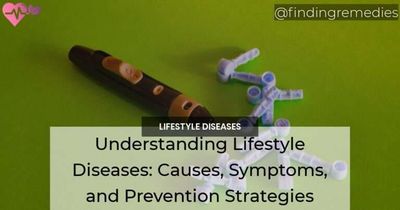In today’s world, lifestyle diseases are becoming more and more common. These chronic conditions, such as diabetes, hypertension, and heart disease, are a result of the modern lifestyles we lead. While the causes of lifestyle diseases are multifactorial and complex, understanding lifestyle diseases and what leads to their development and onset is the first step in preventing and managing them.
In this article, we will discuss the causes, symptoms, and prevention strategies for these diseases in order to equip readers with the knowledge they need to prevent or manage these conditions. We will also explore the importance of lifestyle interventions in preventing and managing lifestyle diseases.
Table of Contents
What are Lifestyle Diseases?
Definition
Lifestyle diseases are a group of chronic diseases that are associated with unhealthy lifestyle habits. These diseases are not infectious and cannot be transmitted from one person to another. They are mostly caused by our daily habits and lifestyle choices.
Types of Lifestyle Diseases
There are several types of lifestyle diseases, including:
- Obesity
- High blood pressure
- Type 2 diabetes
- Cardiovascular diseases
- Cancer
- Respiratory diseases
- Mental health disorders
Causes of Lifestyle Diseases
Unhealthy Diet
Consuming an unhealthy diet that is high in sugar, salt, and saturated fats can increase the risk of developing lifestyle diseases. A diet high in processed foods, junk foods, and sugary drinks can lead to obesity, high blood pressure, and diabetes.
Physical Inactivity
Lack of physical activity can increase the risk of developing lifestyle diseases. Regular physical activity can help maintain a healthy weight, lower blood pressure, and reduce the risk of developing type 2 diabetes and cardiovascular diseases.
Smoking
Smoking is a major risk factor for many lifestyle diseases, including cancer, respiratory diseases, and cardiovascular diseases. Smoking can also lead to premature death.
Alcohol Consumption
Excessive alcohol consumption can increase the risk of developing liver diseases, cancer, and mental health disorders. It can also lead to high blood pressure and obesity.
Stress
Stress can affect our mental and physical health. Chronic stress can increase the risk of developing lifestyle diseases such as cardiovascular diseases, diabetes, and mental health disorders.
Symptoms of Lifestyle Diseases
Obesity
Obesity is characterized by excessive body weight and can lead to several health problems such as high blood pressure, diabetes, and cardiovascular diseases. Obesity is a symptom of lifestyle disease, as well a health condition
High Blood Pressure
High blood pressure is a common symptom of lifestyle diseases. It can lead to several health problems such as stroke, heart attack, and kidney failure.
Type 2 Diabetes
Type 2 diabetes is characterized by high blood sugar levels and can lead to several health problems such as cardiovascular diseases, kidney failure, and blindness. Similar to obesity, Type 2 Diabetes is a condition that is a symptom of a lifestyle disease that you have.
Prevention Strategies for Lifestyle Diseases
Healthy Diet
A healthy diet that is rich in fruits, vegetables, whole grains, and lean protein can help prevent lifestyle diseases. Avoiding processed foods, junk foods, and sugary drinks can also reduce the risk of developing these diseases.
Regular Exercise
Regular physical activity can help maintain a healthy weight, lower blood pressure, and reduce the risk of developing type 2 diabetes and cardiovascular diseases.
Avoidance of Tobacco and Alcohol
Avoiding tobacco and excessive alcohol consumption can reduce the risk of developing lifestyle diseases.
Stress Management
Practicing stress management techniques such as meditation, yoga, and deep breathing can reduce the risk of developing lifestyle diseases.
Regular Health Check-ups
Regular health check-ups can help identify any early signs of lifestyle diseases and prevent their progression.
In conclusion, Lifestyle diseases are a major health problem worldwide. Adopting healthy lifestyle habits such as a healthy diet, regular exercise, and stress management can help prevent these diseases. Avoiding tobacco and excessive alcohol consumption can also reduce the risk of developing lifestyle diseases. Regular health check-ups can help identify any early signs of these diseases and prevent their progression. By making simple lifestyle changes, we can lead a healthy and fulfilling life.

